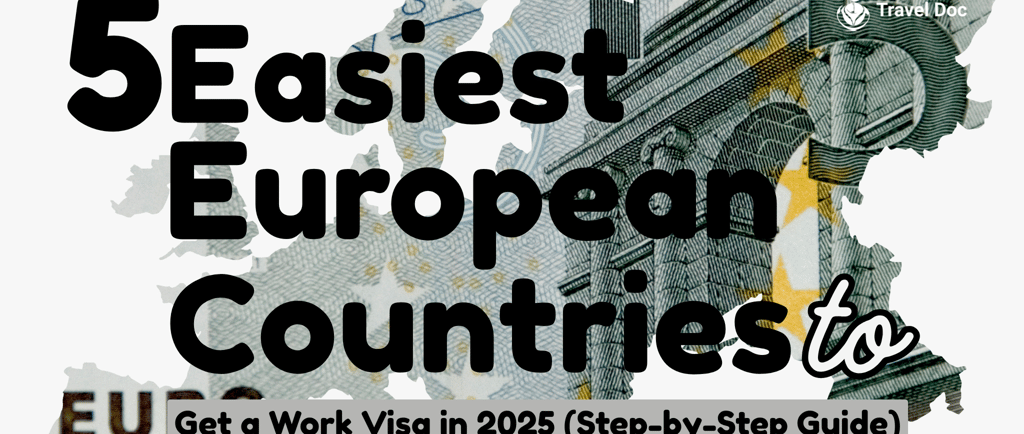5 Easiest European Countries to Get a Work Visa in 2025 (Step-by-Step Guide)
Dreaming of working in Europe but overwhelmed by complicated visa rules? You're not alone! The good news is that some European countries are making it much easier for non-EU citizens to get a work visa—even without a university degree.


Dreaming of working in Europe but overwhelmed by complicated visa rules? You're not alone! The good news is that some European countries are making it much easier for non-EU citizens to get a work visa—even without a university degree.
Here’s your ultimate 2025 guide to the 5 easiest European countries to get a work visa, including how to apply, documents you need, and where to find jobs.
✅ Perfect for Africans, Asians, and Latin Americans looking for real job opportunities in Europe.
✅ 1. Romania – The #1 Easiest Country to Get a Work Visa
Why it's easy: Romania has a massive labor shortage and a fast, low-barrier visa process. No Schengen visa needed, and many employers are open to hiring foreigners!
🔹 High-demand sectors:
Construction, agriculture, transport, hospitality, textile, IT
🔹 How to Apply:
Get a job offer from a Romanian employer
Employer applies for a work permit
You apply for a D/AM long-stay work visa at the Romanian embassy
Travel to Romania and get a residence permit
🔹 Documents Required:
Valid passport
Work permit (from employer)
Accommodation proof
Clean police record
Medical insurance
Visa application form
📍 Visa processing time: 15–30 days
💼 Job sites: eJobs.ro, BestJobs.eu
✅ 2. Portugal – Flexible Work Visas & New Digital Nomad Path
Why it's easy: Portugal has introduced new visa options like the Job Seeker Visa and simplified the process for skilled workers.
🔹 Job Seeker Visa:
Allows you to enter Portugal for 120 days to search for a job legally.
🔹 How to Apply:
Apply directly for the Job Seeker Visa
Once hired, apply for a residence permit
OR get a direct work contract and apply for a work visa from your home country
📍 Processing time: 2–3 months
💼 Job sites: NetEmpregos, Sapo Emprego
✅ 3. Czech Republic – Shortage Occupation Fast Track
Why it's easy: Czechia has a “Fast Track” system for foreign workers in key sectors.
🔹 In-demand jobs:
Truck drivers, welders, nurses, factory workers, IT engineers
🔹 Application Steps:
Secure a job offer
Employer applies for your work permit
Apply for a long-term visa (or employee card)
📍 Processing time: 60–90 days
💼 Job sites: Jobs.cz, Expats.cz/jobs
✅ 4. Lithuania – Super Fast Work Visa for Skilled & Unskilled Jobs
Why it's easy: One of the fastest visa processing times in Europe! Lithuania also offers seasonal and long-term work permits.
🔹 Sectors:
Warehouse work, agriculture, cleaning, drivers, construction
🔹 Application Steps:
Get a job offer
Apply for a national visa (D) or residence permit
Submit at Lithuanian embassy or VFS Global center
📍 Processing time: 7–15 days
💼 Job sites: cvonline.lt, cvbankas.lt
✅ 5. Croatia – Growing Demand for Foreign Workers
Why it's easy: Since joining the Schengen Area, Croatia opened its labor market wider to non-EU citizens.
🔹 Hot job markets:
Hospitality, tourism, transport, and construction
🔹 Application Process:
Employer applies for your work and residence permit
You apply for a D visa
Enter Croatia and finalize residence status
📍 Processing time: 30–60 days
💼 Job sites: MojPosao.net, Posao.hr
🧳 Common Documents Needed for a European Work Visa
Regardless of the country, these documents are typically required:
Passport (valid for at least 6–12 months)
Job offer or contract
Approved work permit (if applicable)
Proof of accommodation
Medical insurance
Police clearance certificate
Application form + visa fee receipt
CV or proof of qualifications
💡 Final Tips to Get Approved Quickly
Use legit job websites or agencies—avoid scams!
Always double-check embassy requirements for your country.
Prepare well for your embassy interview.
Learn basic phrases in the local language (shows effort).
Save enough money for 2–3 months’ expenses post-arrival.
🎯 Conclusion: Which Country Should You Choose?
If you want the fastest and easiest path: Romania is your best bet.
If you're looking for flexible options: Portugal is ideal.
For skilled trades or factory work: Czech Republic and Lithuania are strong options.
Want to live near the Adriatic Sea? Croatia is opening up fast.
Start applying now—2025 is a great year to make your move to Europe! 🚀
💬 Have questions? Drop them in the comments or follow us on TikTok/YouTube for step-by-step guides and real success stories!
